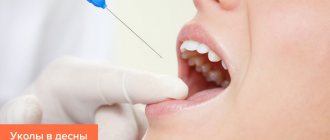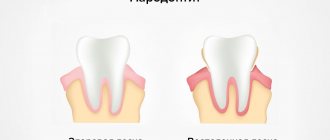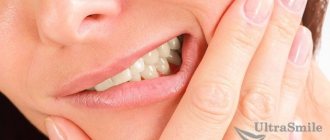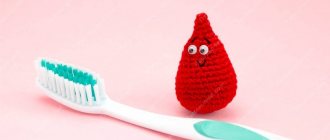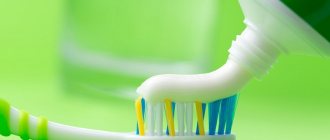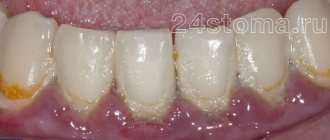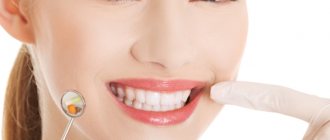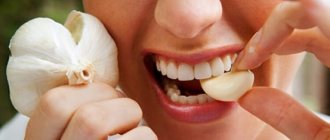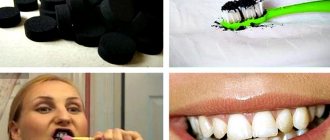Proper brushing of teeth and gums
Plaque on teeth is a common cause of many oral diseases, so it is important to remove it regularly. Buy a soft toothbrush and brush your teeth with it twice a day. Gently massage your gums, this will help strengthen them. Be extremely careful and learn to brush your teeth properly. Remember to clean your tongue using the special back of your toothbrush. Use toothpastes labeled “for bleeding gums.” They usually contain aluminum lactate, baking soda, herbal extracts and other substances that help fight the problem. Don't forget about the power of dental floss: it can be used to remove plaque from hard-to-reach interdental spaces.
Methods and methods for self-treatment of gums at home
If you cannot make an appointment with a dentist to treat your gums, self-treatment of your gums should be done in stages. First of all, it is necessary to relieve pain, then swelling and bleeding in the gums. You can prepare a remedy for gum inflammation yourself. An effective natural remedy for sore gums must be fresh, its shelf life does not exceed 24 hours after brewing. For self-treatment of gum inflammation, you can use decoctions, infusions, ointments, fresh extracts and plant oils. Medicinal products for strengthening gums and teeth are used as solutions for mouth rinsing and as solutions for applications, which should remain in the diseased gums for a certain time, about 20 minutes. The herbs included in the gum rinse for inflammation can be either fresh or dried. Rinse for teeth and gums during inflammation should be regular, preferably at the same time, throughout the entire period of treatment. On average, a course of gum treatment with folk remedies takes 1 – 2 weeks.
General scheme (method) for treating gums at home:
- First we remove swelling and inflammation.
- This requires astringents and antibacterial agents. For example: rinsing with saline solution 2 times a day, calamus root infusion 2 times a day, oak bark decoction 2 times a day, hydrogen peroxide 2 times a day. After each rinse, apply amaranth oil to the sore gum for 20 minutes.
- After 4 - 6 days we change the drugs.
- As the swelling and inflammation subside, keratoplasty drugs are needed. If there is no allergy, we use fresh propolis (not an alcohol tincture of propolis, but propolis oil) for applications to the gums 2 times a day in the morning and evening, during the day we apply sea buckthorn or rosehip oil. We also continue to use amaranth oil, but now in addition to compresses on the gums, also 1 tablespoon inside in the morning and evening.
If the cause of inflammation of the gums is a sore tooth, then swelling of the gums can develop into periostitis (flux), and pus accumulates in the mouth under the gum. This condition is life-threatening, because the spread of pus can go into the internal cellular spaces of the neck and floor of the mouth and be complicated by phlegmon. Such purulent processes are accompanied by high fever, weakness and dizziness, sweating and chills. Therefore, if you are in the city, be sure to consult a doctor. If you are hiking in the forest or mountains and there is no doctor, you need to take broad-spectrum antibiotics or fluoroquinolones (for example, Rulid, Avelox) and, if possible, ensure evacuation by the police or the emergency services of the Ministry of Emergency Situations to the maxillofacial department of the hospital.
Ask a question!
8
We'll call you back in 1 minute
Hydrogen peroxide solution for rinsing
What strengthens weak gums due to bleeding caused by removable acrylic dentures? This is the well-known and accessible hydrogen peroxide! Prepare a mouth rinse solution. You will need hydrogen peroxide (you can buy it at a pharmacy, usually a 3% solution) and water. Add a tablespoon of peroxide to a glass of water. The solution is ready. Rinse throughout the day, three or four times will be enough.
Oak bark for gums: a homemade recipe
Oak bark is one of the remedies that helps to effectively and in a short period of time get rid of bedsores and ulcers caused by wearing dentures and other problems associated with the gums and oral mucosa. In order to prepare the decoction you will need 500 grams of water and oak bark, about 2 tablespoons (pre-grind). Cook the bark over low heat for a quarter of an hour. Leave for 20 minutes. Rinse your mouth with the strained solution.
Rinse with soda for gum inflammation
Baking soda is useful for treating gums at home. We will prepare a soda-based rinse solution. You will need 200 grams of water, a teaspoon of soda, a pinch of salt and a sage decoction (about 50 grams). Mix the ingredients. Rinse at least four times a day.
Herbal rinse solution
If gums are bleeding due to the edges of metal-ceramic crowns, the following solution may be useful: you will need a spoonful of the following herbs: St. John's wort flowers, elderberry and strawberry leaves. Boil the mixture over low heat for 15 minutes, remove from heat. Infuse the decoction for 40 minutes. Rinse your mouth every 2 hours during the day.
Rinse your mouth with St. John's wort infusion
Take a spoonful of herbs, pour boiling water, 200 grams will be enough. Leave for 40 minutes. Strain and rinse your mouth.
Aloe for gum inflammation
Aloe compress: wash the plant leaf, remove the thorns and cut lengthwise. Apply to gums for 15 minutes.
Saline gum rinse
To prepare, you will need salt (it is better to use sea salt), one tablespoon and water, approximately 150 grams. Rinse your mouth with the solution a couple of times a day. You can simply rub salt into your gums. Sea salt relieves inflammation.
Chamomile and calendula for gum inflammation
Self-treatment of gums at home - chamomile and calendula. These plants relieve inflammation well. To prepare the infusion, you will need a tablespoon of chamomile or calendula, pour boiling water over the herb (a glass will be enough). Let it brew. Strain. Alternate infusions.
Let's prepare an infusion of pine buds for gums
To prevent gum inflammation when wearing zirconium crowns, we prepare an infusion of pine buds. This relieves redness and inflammation from irritated areas of the gums. You will need a tablespoon to chop the kidneys. Pour water (you will need half a liter) and boil for 10 minutes. Leave for an hour. Rinse with strained infusion.
Propolis: alcohol tincture for gums
Treatment of gums at home is also possible with an alcoholic infusion of propolis. Add 20 drops of tincture to a glass of warm water and you can begin the rinsing procedure.
Calamus root
To prepare a solution for rinsing, you will need calamus root (a tablespoon of crushed), pour boiling water (200 grams). Let it brew and you can use it. This type of solution copes with inflammation and removes unpleasant odor from the mouth or from under dental crowns.
Honey + salt
One of the well-known and useful methods of relieving inflammation is a mixture of honey and salt (preferably sea salt, of course). To prepare, you will need a spoon of honey and 4 tablespoons of salt. Mix all ingredients. Rub the mixture onto problem areas of the gums.
Black radish
You can treat gums at home at any time. If you have black radish at home, then this is a great way to get rid of bleeding gums. Extract the juice from the fruit and rinse your mouth with it.
Decoction: linden flowers and oak bark
To prepare an effective decoction you will need two tablespoons of crushed oak bark and a spoonful of linden flowers. Mix everything, you get a mixture. Take a spoonful of the mixture and fill it with water (200 grams will be enough). Let it boil for 2 minutes, leave for 20 minutes. Rinse your mouth with warm, strained broth. Thanks to oak bark, the effect will be noticeable after the first procedure.
Nettle leaf decoction for gums
Let's prepare an infusion (decoction) of nettle leaves. You can use fresh or dry leaves and the effect is the same. Just be careful when chopping fresh leaves. To prepare, you will need to pour a spoonful of crushed leaves of the plant with water (200 grams of boiling water). Leave the solution for 30 minutes. Rinse your mouth at least three times a day. To avoid treating inflammation and bleeding gums, eat more vegetables and fruits. Watch your diet. Do not abuse alcoholic drinks and smoking. Be sure to use dental floss after eating or simply rinse your mouth well. Remember that oral hygiene in the morning and evening will help avoid problems with gums and teeth. You can use gum treatment at home, that is, traditional methods, together with medications.
This article is for informational purposes only and does not encourage you to treat your gums at home. We strongly recommend using the recipes described above only after consulting a doctor.
Our doctors
Brodsky Sergey Evgenievich
Deputy Chief Physician, Candidate of Medical Sciences, specialties: dentistry and medical microbiology.
Work experience: since 1999.
Salatsky Dmitry Nikolaevich
Chief physician, orthopedic dentist, gnathologist, maxillofacial prosthetist.
Work experience: since 1988.
Kolikov Dmitry Vladimirovich
Dentist, implant surgeon, orthopedist, therapist
Work experience: since 1999
Skranzhevskaya Svetlana Vladimirovna
Hygienist, dental assistant
Work experience: since 1994
Seredin Evgeniy Vasilievich
Implant surgeon
Work experience: since 2004
Malanova Olga Andreevna
Dentist, orthodontist, therapist
Work experience: since 2021
Rybakova Tatyana Evgenevna
Dentist-therapist-endodontist
Work experience: since 2006
Molodtsov Dmitry Evgenievich
Osteopathic dentist
Work experience: since 1998
Artemyeva Oksana Alexandrovna
Orthopedic dentist, therapist
Work experience: since 2001
Just pick up the phone and call us!
8
We will definitely make you an offer that you cannot refuse!
Rinse
By rinsing, we remove food debris, pathogenic bacteria, and treat gums locally. You can rinse your mouth with a solution of soda, decoctions and diluted herbal tinctures (chamomile, St. John's wort, nettle, sage, oak bark) or special dental rinses. Read the instructions for use carefully! In folk medicine, hydrogen peroxide, carrot juice, and sauerkraut are used (it must be chewed periodically). Please note that rinsing for many diseases is only an additional, concomitant method of treatment.
Causes of bleeding gums.
As a child, our parents constantly told us that we need to brush our teeth thoroughly, morning and evening. Either because of age or due to lack of time, many of us have forgotten about this important rule and, as it turned out, it was in vain. One of the main reasons for bleeding gums and, as a result, their inflammation, is incorrect and inconsistent oral hygiene. It has been proven that after brushing your teeth, within 4-5 hours, harmful microorganisms again accumulate on the surface of the enamel, which gradually transform into soft plaque, and then into hard stone. Carbohydrates especially promote their spread; after absorbing them, bacteria release special acids that negatively affect dental health. Plaque causes gums to become weak and inflamed, and increased plaque leads to the formation of gum pockets. First, the patient develops the disease gingivitis, and if the inflammatory process is not stopped and cured in a timely manner, its complication appears, periodontitis.
There are several causes of bleeding and gum disease:
Soft tissue injury.
It is quite easy to injure the gums; this can happen while eating, and due to improperly installed dentures. Bacteria enter the resulting wound, which can cause inflammation.
Lack of vitamins.
Vitamin K ensures normal levels of blood circulation. If there is a deficiency in the human body, some changes may occur, and bleeding gums may appear, for the treatment of which it will be enough to replenish the level of the vitamin.
Hormonal imbalance.
This problem most often occurs in adolescents, pregnant women, and people with endocrine diseases, because It is in these categories of patients that hormonal changes occur in the body.
Smoking and other bad habits.
Toxic substances produced when tobacco is burned can cause serious damage to your gums and cause them to bleed.
Pregnancy.
As mentioned earlier, expectant mothers undergo serious changes in their bodies, one of the reasons for which is changes in hormonal levels. Gums during pregnancy usually swell and therefore become more vulnerable to external irritants. This unpleasant consequence disappears after the birth of the child, and the condition of the periodontal tissue returns to normal.
Insufficient oral hygiene.
Irregular cleaning of teeth leads to the active proliferation of pathogenic bacteria that settle on the surface of the enamel. Which contributes to the appearance of bad breath and an inflammatory reaction.
Medicines
Among the medications that are traditionally used for bleeding gums, we can name Cholisal, Metrogyl Denta, Kamistad, Asepta. All these gels have both an analgesic, antiseptic and wound-healing effect. If a child has problems with gums, then such gels will be the best first aid medicine.
Among the herbal remedies, we found the liquid rinse preparation Stomatofit. It is made on the basis of extracts of medicinal herbs that heal gums. It has no side effects, but is not recommended for people allergic to chamomile and arnica.
Is treating gum disease at home effective?
The clear answer to this question is yes, but subject to two conditions:
- regularity of procedures;
- following the indicated dosage and method of preparation of medicines.
However, if the disease progresses and is accompanied by an increase in temperature, the appearance of pus, and loosening of teeth, then treating inflammation of the gum pocket at home will not only not produce results, but may worsen the situation. In this case, emergency assistance from a qualified periodontist is required, who will carry out hardware treatment: for example, using the ultra-modern Vector device, which operates on ultrasound.
A guaranteed effect in the treatment of gum inflammation at home is only possible if this is not the result of self-medication, but detailed compliance with the doctor’s prescriptions.
Dental care
Try to take care of your dental health regularly. Be sure to remove plaque, as it is an excellent breeding ground for bacteria. Plaque and tartar can also be removed in the dentist’s office using professional teeth cleaning and the AirFlow method. This significantly improves the health of the oral cavity, restores the natural balance of bacteria, cleans hard-to-reach places, and restores the natural whiteness of teeth. Moreover, such care is absolutely painless for the patient! It is recommended to have professional teeth cleaning once a year.
Prevention
You may not encounter bleeding from your gums at all if you follow simple preventive measures:
- Your diet should be balanced - no need for strict diets, just reduce the amount of spicy, salty and sour foods, add more fresh vegetables and fruits to your diet.
- Choose your toothbrush more carefully.
- Brush your teeth regularly and rinse your mouth between meals if brushing your teeth is not possible.
- Minimize or completely give up bad habits, in particular smoking and drinking alcohol.
- Carry out preventive examinations with a dentist at least twice a year and treat any detected diseases.
